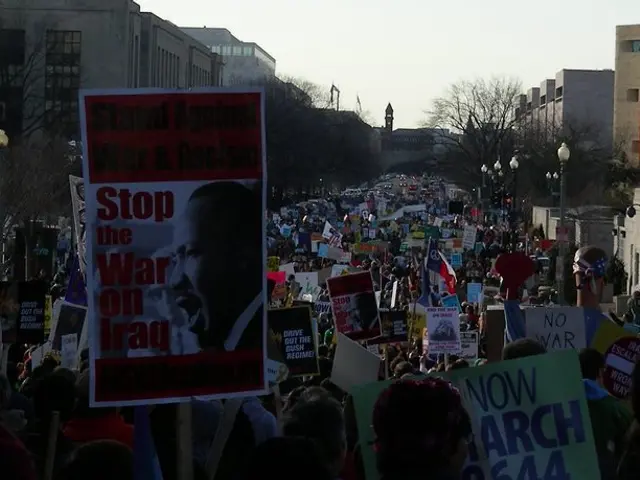Federal Housing Mandate Proposal: Is it acceptable for the federal government to compel homeless individuals to reside in shelters?
In the heart of Washington D.C., the debate over President Trump's crime-fighting efforts is heating up. The strategies being employed, particularly in relation to homelessness, have become a significant issue within the city.
The federal government, through Executive Order 14321 titled "Ending Crime and Disorder on America’s Streets," has enacted a series of measures aimed at addressing homelessness in the context of crime control. These measures mark a departure from the previous "Housing First" model, shifting focus towards enforcement and mandatory behavioral health interventions.
Key policies include ending support for "Housing First" policies, which prioritise housing people quickly without requiring sobriety or mental health treatment first. Instead, programs are being developed that condition housing assistance on participation in treatment for substance use or serious mental illness.
In addition, there are increased accountability and enforcement measures, such as requiring homeless assistance program recipients to mandate that participants with substance use disorder or serious mental illness engage in treatment as a condition for housing.
The use of involuntary psychiatric commitments for homeless individuals is also being expanded, with civil commitment laws being altered to allow forced treatment in more cases. This includes policies to relocate homeless individuals from public spaces, sometimes against their will, justified by mental health and public safety concerns.
The deployment of law enforcement and National Guard forces to clear homeless encampments, particularly in Washington, D.C., is another significant aspect of these strategies. The intention is to reduce visible homelessness and related street crime, with plans to move people to other shelters or "tent cities" far from urban centers.
Legal action against programs that facilitate drug use by homeless people on federally funded sites is also being pursued, with the Department of Justice tasked to investigate and prosecute violations involving drug injection sites or distribution of drug paraphernalia.
These measures, which prioritise enforcement, mandated treatment, restrictions on housing assistance eligibility, involuntary commitments, and clearing of encampments, represent a punitive turn in federal homelessness policy tied explicitly to crime reduction. Experts warn that these policies risk criminalizing homelessness and increasing barriers to housing without expanding supportive services, which may worsen long-term outcomes for unhoused individuals.
The presence of federal law enforcement and the National Guard on D.C. streets is a direct result of these crime-fighting efforts. The actions of these entities are closely tied to the ongoing debate about President Trump's strategies to combat crime in the city. As the debate continues, the impact of these strategies on the homeless population and the city as a whole remains a topic of concern.
- The new federal homelessness policy-and-legislation, as outlined in Executive Order 14321, is shifting towards stricter enforcement and mandatory behavioral health interventions as part of President Trump's crime-fighting efforts in politics.
- The general-news about President Trump's strategies to combat crime in Washington D.C. includes increased attention on the impact of policy-and-legislation changes on homelessness, as well as the use of law enforcement for clearing homeless encampments and pursuing legal action against programs facilitating drug use.





